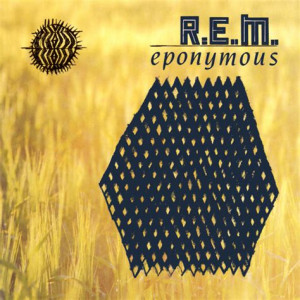Published on Mar 25, 2000
When R.E.M. left the small-label surroundings of I.R.S. for the
greener pastures of a major-label deal late in the ’80s, the
immediate response from their former label was to capitalize on the
success of their former client. Two records in quick succession –
the best-of
Eponymous and the b-sides collection
Dead Letter Office – cropped up, ready for eager fans to
snatch from the shelves.
It may have seemed strange for a band like R.E.M. to have a
“greatest hits” album out when they really were just beginning to
taste mainstream success in 1988. But what
Eponymous does is more than just collect tracks from the
band’s stay at their former label; it provides the listener with a
history of where the band came from and what they were about to
become. If you didn’t bother picking up albums like
Life’s Rich Pageant or
Reckoning, then this is going to be an education for you. If
you were one of the people who got into R.E.M. on the ground floor,
this is a wonderful trip down memory lane.
One of the gems of this collection is the inclusion of the
original version of “Radio Free Europe” that Michael Stipe and crew
released on Hib-Tone, a small indie label, back in 1981. It’s
interesting to hear the birth cry of a band, and R.E.M. almost
shows the listener that they’re planning on being in the race for
the long run with this one song. (For the longest time, I preferred
the grittier emotion of this version to the studio-polished one on
Murmur.)
If there’s one word that could be used to describe the mood of
Eponymous, it’s this: fun. No, really. From the early days
of songs like “Talk About The Passion” and “So. Central Rain” to
the pre-superstar work from
Document like “The One I Love” and “It’s The End Of The
World As We Know It (And I Feel Fine)”, the selection of tracks
make this sound less like a label trying to capitalize and more on
rejoicing in the music they left behind.
True, there are one or two questionable inclusions here, such as
the country-tinged “(Don’t Go Back To) Rockville” and the
lost-genred “Romance”. But even these songs show the quirky charms
of R.E.M. and how they refused to let themselves be pigeonholed
into any one category.
In a way, the R.E.M. that existed before 1990 was an entirely
different band than the one we know today. While I’d still argue
that
Document is the must-own album of this portion of R.E.M.’s
history,
Eponymous is a delightful way to get acquainted with the
group’s early days – and is sure to spur you into checking out some
of those albums.
